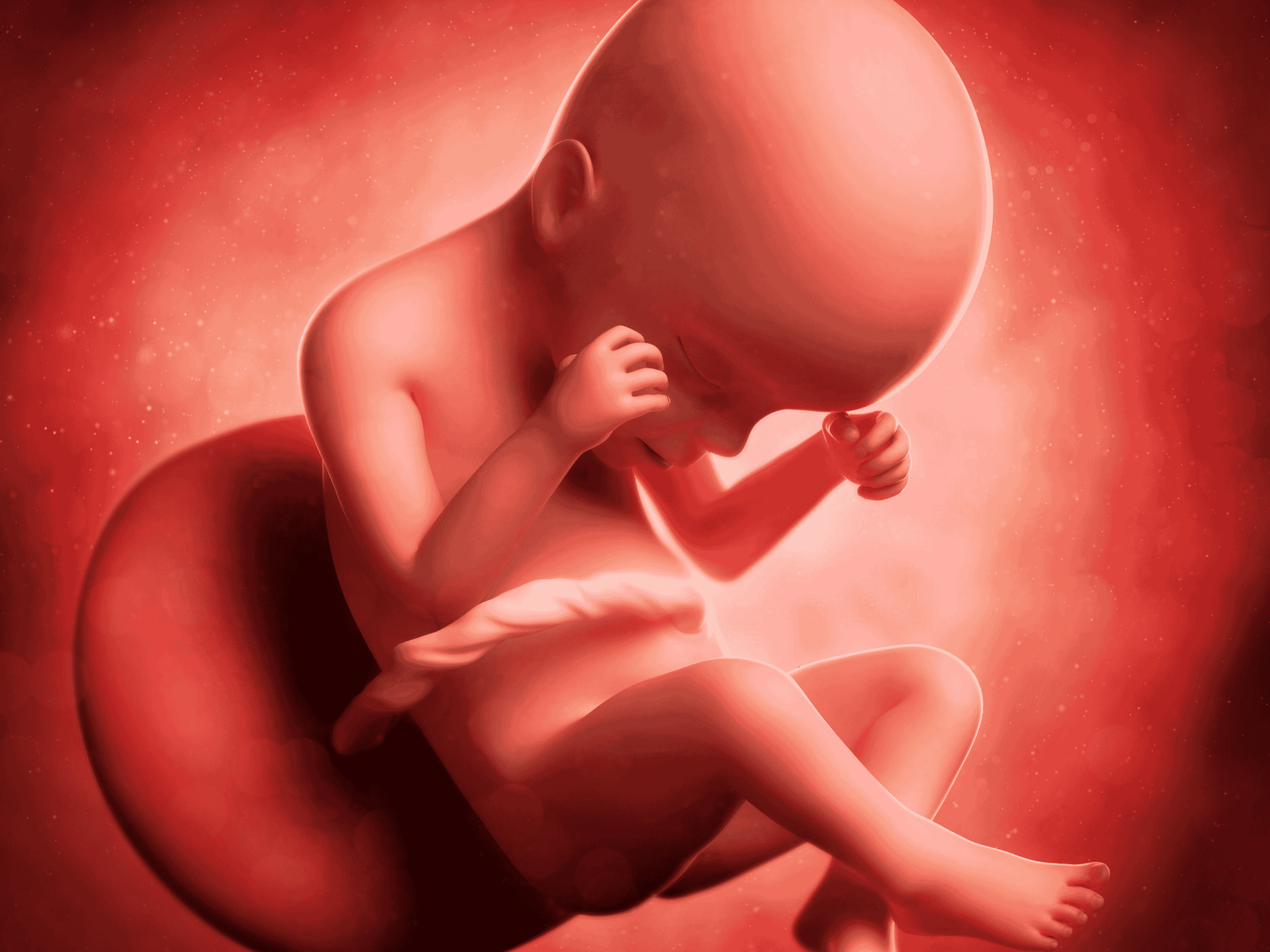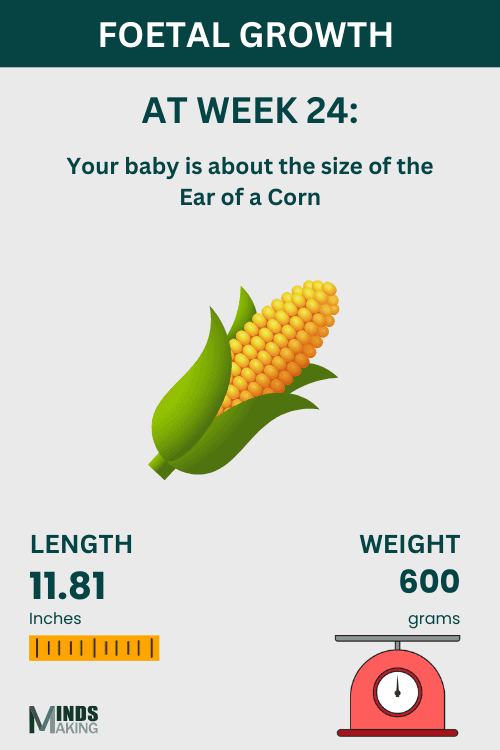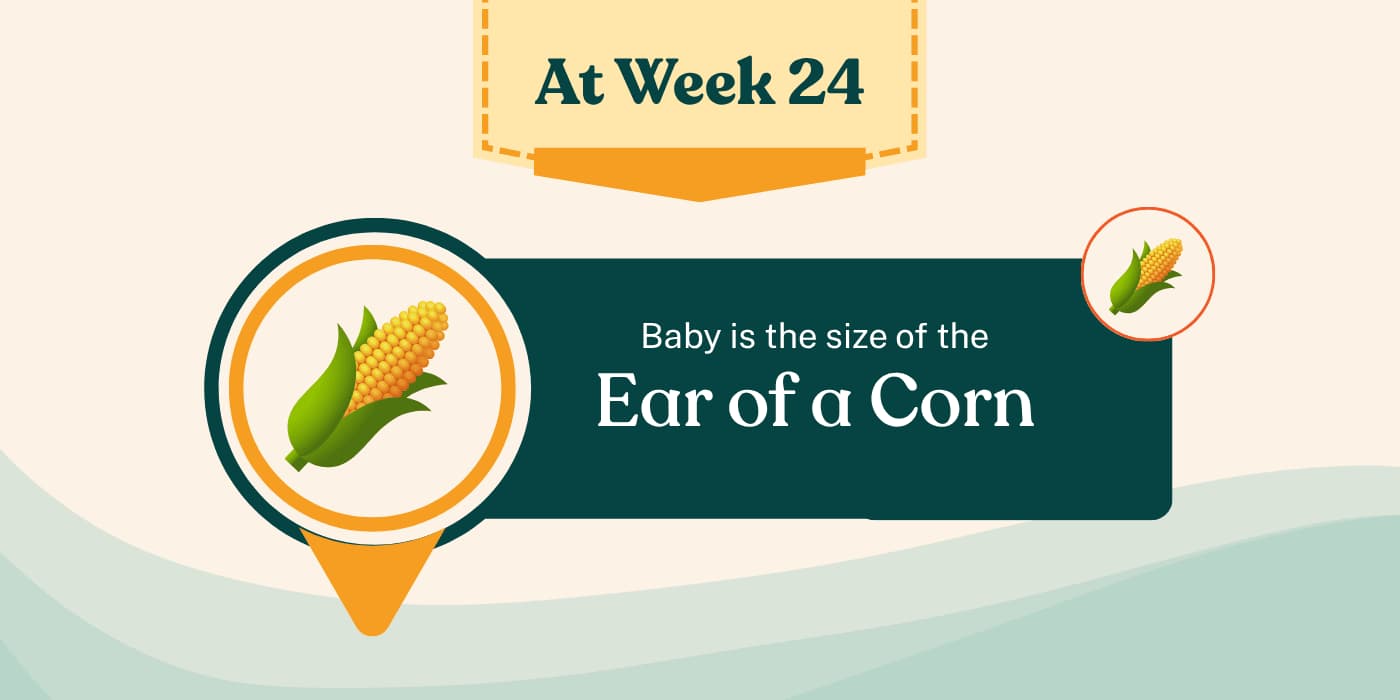Your Pregnancy at Week 24
Science photo library

Written by Mindsmaking Medical Writer
Fact Checked by Mindsmaking Professionals
27th, July, 2025
At 24 weeks pregnant, you're nearing your third trimester. Your baby is now generally considered viable with about a 50% survival chance if born but still has significant growing to do.
At 24 weeks pregnant, you're steadily approaching your third and last trimester, now less than few weeks away. This week is particularly significant as it marks the point at which a foetus is generally considered viable, meaning that if your baby were born now, it'd have about a 50% chance of survival with proper medical support. But as they are currently only the size of a corn ear, they still have a lot of growing to do.
Key Takeaways
The lungs are becoming more developed, forming branches of the respiratory system and special cells that produce surfactant, essential for easy inflation of air sacs.
Your baby measures around 11.81 inches and weighs about 600 grams, comparable to the ear of corn.
At 24 weeks pregnant, you can feel the top of your uterus about 2 inches (5 cm) above your belly button.
You might notice changes in your belly button due to the swelling of your uterus and the additional pressure. These changes aren't permanent.
Pregnancy hormones can reduce tear production, leading to dry eyes and irritation.
A rush of warm fluid or a gradual drip from the vaginal area could indicate amniotic fluid leakage.
Adequate water intake is crucial for your health and your baby's growth. Aim for about 10 cups of fluids per day, primarily from water.
As the birthing partner, attending childbirth classes can provide valuable tips and information on supporting them during labour.
A belly band supports the lower back and is especially useful during exercise to alleviate discomfort and support your growing belly.
Take a peek

Ears
Your baby's hearing system(auditory system) is developing rapidly, so if he hears a certain song regularly now, he may identify it and find it comforting when he is born.

White hair
Your baby still has white eyelashes, brows, and hair that have yet to develop pigment.

Weight gain
Your little one is gaining a lot of weight due to the accumulation of baby fat and the growth of muscles, organs, and bones. This fat does more than smooth wrinkles. It also aids in the baby's ability to retain body heat and regulate temperature.
Baby Development at Week 24
Your baby has entered a fast-growing period since last week and is now gaining approximately 90 grams each week. This weight gain is caused by the development of fat in your baby's body. Fat in your baby's body helps to even out wrinkles on their skin, maintain body heat, and regulate body temperature.
Your baby's face is fully formed, with eyebrows, eyelashes, and hair. However, all the hair is white since pigment has not yet developed. You might feel your baby constantly moving, and hiccups could cause their little body to jolt. Your baby can now hear noises inside and outside the uterus.
The brain is developing rapidly, and taste buds are forming. The lungs are becoming more developed and forming the branches of the respiratory system along with special cells that will produce surfactant essential for the air sacs to inflate easily. Premature babies often struggle with breathing because these cells haven't had enough time to develop or aren't producing enough surfactant yet. (1)
Mindsmaking

Body Changes at Week 24
At 24 weeks pregnant, you can feel the top of your uterus about 2 inches (5 cm) above your belly button. The stretching skin on your abdomen and breasts may cause these areas to feel itchy. To relieve this, you can use a moisturiser or lotion. Your eyes might feel more sensitive and dry during pregnancy, and using artificial tears can help keep them moist and reduce discomfort.
You might notice changes in your belly button due to the swelling of your uterus and the additional pressure. These changes aren't permanent.
By week 24, expectant mothers usually gain around 14-16 pounds, but everyone is different. Consult your doctor for personalised advice on healthy weight gain at this stage. You might feel your baby moving by placing a hand on your belly, and later in pregnancy, you and others may even see the movements. Remember, it's okay to tell others not to touch your belly if it makes you uncomfortable. It's your body and your baby's home.
An important prenatal test, the glucose screening, is typically conducted between weeks 24 and 28 to test for gestational diabetes, a temporary type of diabetes that can occur during pregnancy and may cause issues for the newborn, such as low blood sugar. Gestational diabetes can also increase the likelihood of needing a C-section due to the potential for very large babies.
During the glucose screening test, after drinking a sugary solution, you'll have your blood drawn, and if blood sugar levels are too high, you'll need additional tests, which your healthcare provider will explain. Gestational diabetes can often be managed with a well-planned diet and regular exercise, but some women may require medication, such as daily insulin, during pregnancy. (6)
Read This Next
No posts available
Baby Bump At Week 24
Your midwife or doctor will measure your baby bump at each antenatal appointment. They'll use a tape measure to check the distance from the top of your bump to the top of your pubic bone. At this stage, your fundal height in centimetres typically matches the number of weeks you're pregnant. So, at 24 weeks, the distance from your pubic bone to the top of your uterus should be about 24 centimetres, with a margin of plus or minus 2 centimetres.
Many women worry about the size of their bump, thinking it might mean they're having a big baby or that their baby isn't growing well if their bump seems small. It's important to remember that baby bumps come in all shapes and sizes, so try not to compare yours to others. However, if you have concerns about your baby's growth, speak to your midwife.
If the measurements indicate concerns about your baby's growth, you will be referred for an ultrasound scan. This doesn't necessarily mean there's a problem; the scan is simply a more precise way to assess how your baby is developing.
Pregnancy Symptoms at Week 24

Vision changes
Pregnancy hormones reduce tear production, leading to dry eyes and irritation. You might also notice your vision becoming slightly blurred. This happens because the hormones increase the curvature of your eye, altering your vision. These changes are temporary and will resolve after your baby is born.

Itchy skin
You might find that your skin, particularly over your bump, is itchy. This is due to pregnancy hormones and the increased blood volume in your body. To alleviate this, wear loose clothing made of breathable fabrics like cotton and take cool baths or showers. If the itching worsens, especially at night and affects your palms and soles, inform your GP. This could be a sign of obstetric cholestasis, a rare liver disease during pregnancy.

Haemorrhoids
You might also deal with haemorrhoids or piles, essentially varicose veins in your bottom. Similar to the veins in your legs, the veins in your bottom can stretch and fill with blood, leading to pain and swelling. Haemorrhoids are common during pregnancy because hormones slow down digestion and cause constipation. Straining during bowel movements puts extra pressure on the veins around your bottom, causing them to swell.

Backache
Around 24 weeks pregnant, you might start experiencing backache, a common second-trimester symptom. This is often due to hormonal changes that relax the ligaments in your body, which can strain your lower back and pelvis, causing back pain. For similar reasons, you might also feel discomfort around your ribs, breasts, buttocks, and abdomen. Between 50% and 80% of pregnant women experience back pain at some point during pregnancy. So, if you're dealing with it, as frustrating as it may be, you're certainly not alone. Fortunately, some simple tips and tricks can help alleviate the pain. Avoid heavy lifting, consider wearing a support belt, and explore options like massage, using rollers, and doing specific exercises to ease the discomfort.

Stretch marks
Around this time, you might notice stretch marks forming on your tummy, thighs, breasts, or hips. These occur when the collagen fibres in the middle layer of skin (the dermis) stretch and tear to accommodate your enlarging body. Unfortunately, no creams can penetrate the outer layer of skin to reach the dermis, regardless of what the label claims. However, if you wish, massage your tummy with an emollient cream or one containing Vitamin E. The best time to do this is after showering when your skin is still warm and damp, and the pores are more open.

Shortness of breath
You might find yourself experiencing shortness of breath during pregnancy due to your increased need for oxygen and the effects of progesterone on your lungs and the respiratory centre of your brain. While mild shortness of breath is normal, if you have shortness of breath, a persistent cough, and chest pain, these are warning signs requiring immediate medical attention.
Pregnancy Concerns at Week 24
You should watch out for premature labour this week. Contact your healthcare provider if you have an unusual discharge, vaginal bleeding, stomach cramping, pelvic pressure, lower back pain, or leaking fluid.
Vaginal leaking of amniotic fluid, a rush of warm fluid or a gradual drip from the vaginal could indicate amniotic fluid leakage. It will normally be clear and odourless, but traces of blood or mucus may occasionally be present. It's doubtful that the liquid will cease leaking if it's amniotic fluid. If you think you're leaking amniotic fluid at any time before your due date, Please call your caregiver.
Health Tips for Pregnancy Week 24
Eat B12-rich foods
A healthy pregnancy diet should include sufficient Vitamin B12, vital for maintaining healthy blood and nerve cells and aiding in DNA production. While foods rich in B12 are beneficial, you must consult your doctor before taking extra supplements. B12 can be obtained from meat, fish, milk, cheese, eggs, and certain fortified breakfast cereals. If you follow a plant-based diet, discussing with your healthcare provider how to ensure adequate B12 intake is essential.
Take short showers
If you're experiencing dry skin during pregnancy, long showers or baths could exacerbate the issue by removing moisture from your skin. While it's still okay to enjoy an occasional long soak, consider opting for shorter showers or baths, especially in warm, not hot, water, and use a gentle cleanser. Using a moisturiser or placing a warm-mist humidifier in your room can relieve dry skin. This regimen not only helps alleviate dryness but also serves as good practice for the demands of motherhood ahead.
Stay hydrated
As an expectant mother, adequate water intake is essential for your health and to support your growing baby. Health professionals recommend drinking approximately 10 cups of fluids daily, with water being the primary source. If you forget to hydrate amidst a busy schedule, consider setting reminders on your phone to drink a glass of water every few hours. You can also utilise hydration apps to track your intake and receive reminders if you fall behind. Another helpful strategy is to set out full water bottles at the beginning of each day as a visual cue to ensure you consume an adequate amount.
Eat calcium-rich foods
It's important to ensure that your diet includes enough calcium-rich foods to support the development and growth of your baby's bones during pregnancy. Incorporate cheese, eggs, milk, yoghurts, oranges, nuts, pulses, and broccoli into your daily meals and snacks to maintain sufficient calcium levels. You should also take 10mcg of vitamin D daily, which aids calcium absorption.
Floss regularly
Maintaining good dental hygiene during pregnancy is crucial for you and your baby's health. Research indicates that gingivitis, a common condition characterised by inflammation of the gums, can potentially escalate to periodontitis if not properly addressed. Periodontitis, a more severe form of gum disease, has been associated with an increased risk of premature birth if left untreated. Therefore, it's essential to prioritise regular dental check-ups and practise proper oral hygiene, including brushing and flossing regularly, to reduce the risk of gum disease and its potential complications during pregnancy.
Advice for Partners
If your pregnant partner is considering childbirth options at 24 weeks, you have the opportunity to assist them with their birth plan. If you'll be the birthing partner, attending childbirth classes to learn how to support your partner during labour can provide invaluable guidance and insights. Preparing together for the upcoming experience will be beneficial for both of you.
Planning a romantic getaway can be a wonderful way to strengthen your bond. Consider choosing a destination that holds special significance for both of you, such as a place where you shared a memorable experience or an entirely new location you've always dreamed of visiting together. This trip can provide a meaningful and refreshing escape from daily routines, allowing you to focus on each other and create lasting memories.
Pregnancy Checklist for Week 24
- You might consider getting a belly band that provides lower back support. These bands can be particularly beneficial during exercise, helping to alleviate discomfort and support your growing belly.
- Consider interviewing potential paediatricians, as the chosen doctor will likely see your baby within 24 hours of birth. Before deciding, ask questions about appointment availability, hospital affiliations, vaccines, and circumcision.
- Treat yourself to a prenatal massage. Find a massage therapist with specialised training in providing care for pregnant individuals.
- During the third trimester, there will be numerous tasks to manage, so it's wise to start preparing by tackling important things like gathering baby essentials before your little one's arrival.
- Knowing what preparations are required beforehand is essential if you have a GTT (Glucose Tolerance Test) scheduled. Contact your midwife for clear instructions and guidance if you're unsure about what steps to take.
Frequently Asked Questions
How big is my baby at week 24 of pregnancy?
Your baby is at a time when all it is doing is growing and growing. Your baby should weigh about 600 grams and measure 11.81 inches in length. They can be compared to an ear of corn.
Is my baby fully developed at 24 weeks of pregnancy?
Although your baby already looks like a newborn, at 24 weeks, it still needs to gain a significant amount of fat, and its lungs aren't fully developed. While it is growing, its taste buds have already developed, along with fingerprints and footprints, but its brain is still developing and growing. Your baby is getting closer to being ready to meet you, but there's still important progress to be made inside your 24-week baby bump.
What position is my baby in at 24 weeks pregnant?
At 24 weeks pregnant, your baby is still small enough to change position frequently. They might be upright, sideways, or transverse, sometimes uncomfortable. You might determine your baby's position by noting where you feel their kicks and punches.
How many months am I at 24 weeks pregnant?
It's normal to wonder how 24 weeks of pregnancy translates into months. At 24 weeks, you're likely in your sixth month of pregnancy. However, different methods exist for dividing the 40 weeks of pregnancy into months, so don't be surprised if your healthcare provider uses a different system.
How is my baby developing at week 24 of pregnancy?
At 24 weeks, your baby is growing rapidly, gaining about 90 grams per week as fat develops to smooth the skin and regulate body temperature. Their face is fully formed with eyebrows, eyelashes, and hair, though all hair remains white due to a lack of pigment. Your baby moves frequently, and hiccups may cause gentle jolts. They can now hear sounds both inside and outside the womb.
Was this article helpful?
How many stars are you giving this article?
Leave a comment
Your email address will not be published.










































